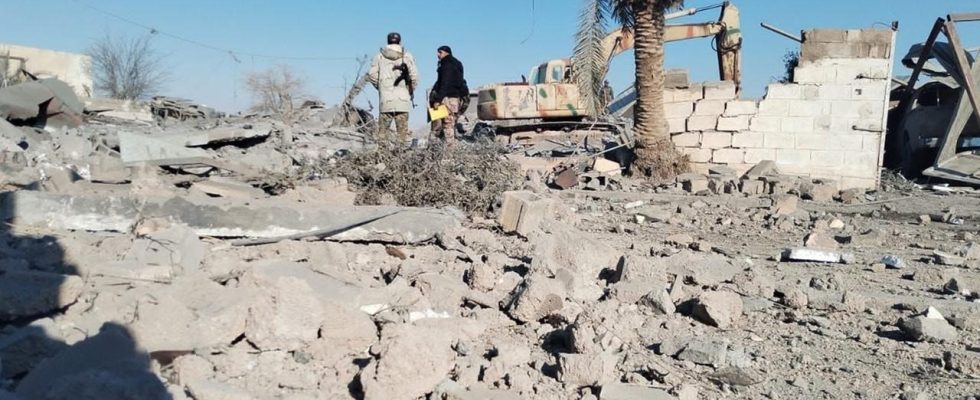The region’s security is on the “edge of the abyss” and the consequences are unforeseeable: Iraq and Syria have condemned the nightly US attacks. There are growing international concerns about a further escalation of tensions.
Iraq and Syria have sharply criticized nightly US airstrikes on suspected pro-Iranian militia positions in both countries. Iraqi government spokesman Bassem al-Awadi said the security of Iraq and the region was “on the brink of the abyss” because of the attacks. He rejected “false allegations” that there had been “coordination” with the US government before the bombings. At least 16 people, including civilians, were killed in the country in the attacks.
An Iraqi military spokesman said the attacks violated the country’s sovereignty. They represented a threat “that will drag Iraq and the region into unforeseeable consequences, and their consequences will be terrible for the security and stability in Iraq and the region.”
The Syrian Foreign Ministry said what the US did helped fuel the conflict in the Middle East in a very dangerous way. State agency Sana quoted the Defense Ministry as saying the attacks were “an attempt to weaken the capabilities of the Syrian army and its allies in the fight against terrorism.” The “US aggression” killed several civilians and military personnel and caused serious damage.
Retaliatory attacks after the death of three US soldiers
The US military said it attacked more than 85 targets in Syria and Iraq during the night that are linked to the Iranian Revolutionary Guards and militias they support. The US was reacting to the violent death of three US soldiers who were killed a week ago in Jordan near the border with Syria. The government in Washington blames radical militias supported by Iran. Since mid-October there have been more than 165 attacks on bases in Iraq, Syria and Jordan where soldiers of the US Army and its allies are stationed.
The aim now is to reduce the ability of the Iranian Revolutionary Guard and its allies in the region to carry out further attacks on US forces, said the communications director of the US National Security Council, John Kirby. President Joe Biden announced that US retaliatory attacks would continue in due course.
According to the US, the attacks were directed against pro-Iranian targets in Iraq and Syria. Local media reported that in Iraq, positions in Al Qaim and the command center of the pro-Iranian Popular Mobilization Units on the border with Syria were hit.
Iran: “Strategic mistake”
Criticism of the US attacks also came from Iran. They violated the sovereignty and territorial integrity of the two countries, explains Foreign Ministry spokesman Nasser Kanaani. The attacks represented “another adventurous and strategic blunder by the United States that will only lead to increased tension and instability in the region.”
The spokesman accused the USA of trying to cover up Israeli war crimes in Gaza. This is a “strategic miscalculation” by the US government and will only draw Washington further into the conflict between Israel and Palestine.
“Cauldron that could explode”.
There is growing international concern about further escalation in the region. EU foreign policy chief Josep Borrell warned of an escalation in tensions. The Middle East is a “cauldron that could explode,” he said on the sidelines of an informal meeting of EU foreign ministers in Brussels. Everyone involved is called upon to make every effort to avoid an escalation.
According to news agencies, there were different comments on the latest developments from the foreign ministers of the EU states. “In recent weeks we have seen attacks on US bases where US citizens have also died. That was irresponsible,” said German Minister of State for European Affairs Anna Lührmann at the EU meeting in Brussels. The US responded to these attacks to prevent them from happening again and made it clear that it did not want an escalation in the Middle East.
The Belgian Foreign Minister Hadja Lahbib, however, was much more critical. She said there was now a real risk that the Middle East crisis would spread. Polish Foreign Minister Radoslaw Sikorski, however, said: “Iran’s proxies have been playing with fire for months and years – and now it is burning them.”
London: “Support right to respond to attacks”
Great Britain, in turn, signaled support. “The UK and US are loyal allies. We would not comment on their operations, but we support their right to respond to attacks,” said a British government spokesman. “We have long condemned Iran’s destabilizing activities across the region, including its political, financial and military support to a range of militant groups.”
The United States and Britain began coordinated attacks last month on Yemen’s Houthi rebels, who in turn have repeatedly attacked merchant ships in the Red Sea. The Houthis, who are supported by Iran, see their attacks as an act of solidarity with Hamas in the Gaza Strip.
Tilo Spanhel, ARD Cairo, tagesschau, February 3rd, 2024 1:39 p.m

